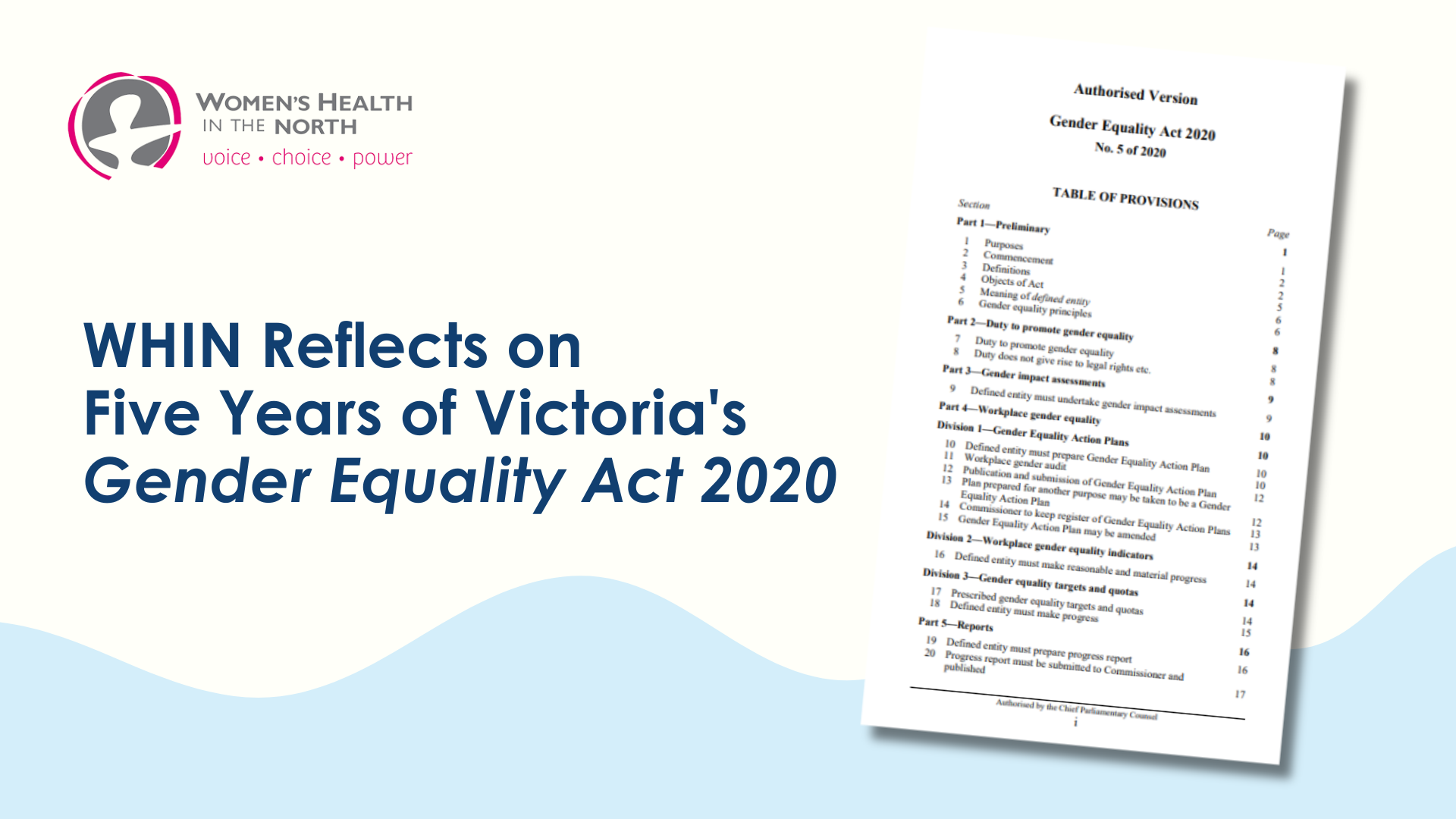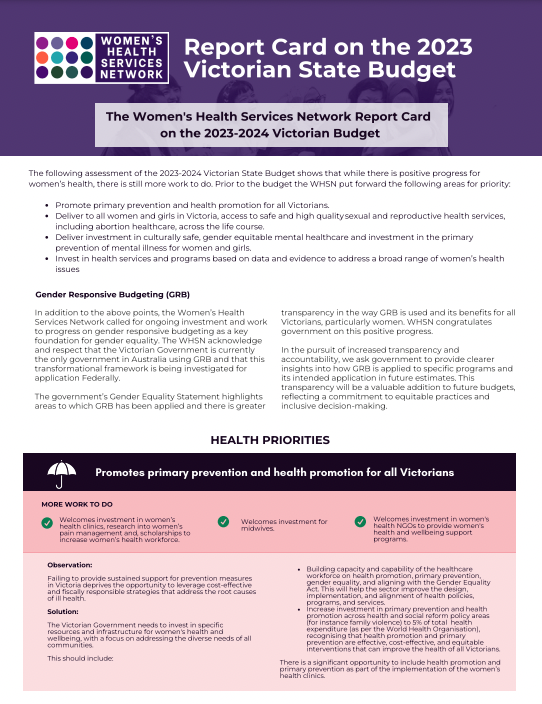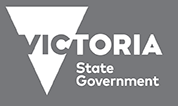Get help - If in immediate danger call 000
Get help in Arabic, Farsi, Hindi, Punjabi, Simplified Chinese, Sinhala, Turkish, Urdu and Vietnamese
The Board of Women’s Health In the North (WHIN) is delighted to announce the appointment of Carolyn Gillespie as our new Chief Executive Officer, effective 28 July 2025.
Carolyn joins WHIN with an impressive track record of leadership in gender equity, health, and community advocacy. Her appointment marks an exciting new chapter as we continue to drive change to improve the health, safety and wellbeing of women and gender-diverse people in Melbourne’s north.
Throughout the selection process, the Board was deeply impressed by Carolyn’s unwavering commitment to feminist principles and intersectional practice—values that are at the heart of WHIN’s work. Her strategic leadership experience, collaborative style and proven ability to influence systems align strongly with WHIN’s priorities and the vision outlined in our Strategic Plan.
Carolyn brings with her more than 15 years executive experience in health and social justice across the not-for-profit, community-controlled and public sectors, most recently as Co-CEO of the Victorian Collaborative Centre for Mental Health and Wellbeing, a statutory body established following the Royal Commission into Victoria’s Mental Health System. We are confident her appointment will further strengthen WHIN’s impact and partnerships across the region and beyond.
On behalf of the Board, staff, and our community partners, we warmly welcome Carolyn to WHIN and look forward to the energy, insight and commitment to centering lived experience she will bring.
We also extend our sincere thanks to Tracy Taylor-Back and Adriana Uteda for their leadership and commitment during their time as Interim CEO. Their steady guidance and strategic focus have been invaluable in navigating this transitional period.
Petra Begnell
Chair of the Board
Women’s Health In the North
We call on all political parties and candidates to commit to ensuring affordable, accessible abortion care in Australia. See our joint statement in full with Women’s Health Services Network (WHSN) members and partners.
Abortion is essential healthcare and must be accessible—no matter where you live, who you are, or how much money you have.
Australia’s healthcare system is built on the promise of universal access. Yet for many, abortion remains difficult to access—due to geography, cost, limited providers, stigma, and discrimination. These barriers disproportionately impact people on low incomes, those in rural and remote communities, young people, Aboriginal and Torres Strait Islander communities, and migrant and refugee communities.
The rise of the anti-rights movement is threatening sexual and reproductive health rights around the world—and Australia is not immune. We are seeing renewed attempts to wind back abortion rights in some states and territories.
Now more than ever, we need bold, unified political leadership at all levels of government to protect abortion rights and strengthen access.

Five years ago, Victoria led the way with the Gender Equality Act 2020, a game-changing piece of legislation driving positive change across public sector workplaces.
The Gender Equality Act aims to promote gender equality and address the systemic causes of gender inequality. It applies to Victorian public sector organisations that have 50 or more employees.
Under the Act, these organisations are required to:
- take action towards achieving workplace gender equality, and
- consider and promote gender equality in their policies, programs and services.
Since the Act was first enacted in 2020, WHIN has been proud to support nearly a dozen organisations in embedding gender equality into their policies, programs, services and workplaces.
WHIN’s Impact So Far:
- Worked with 11 organisations, including state and local governments, tertiary education, and health organisations
- Supported the development of five Gender Equality Action Plans
- Delivered 18 Gender Impact Assessments training sessions
- Trained 230+ professionals across state government, local government, tertiary education, and health.
The Gender Equality Act has not only fostered safer and more inclusive workplaces but also driven intersectional gender analysis across policies and services – benefiting all Victorians.
WHIN remains committed to championing gender equality and creating meaningful, lasting change.
Here’s to the next five years of progress!
The Northern Integrated Family Violence Services (NIFVS) are seeking an Expert by Experience representative to join the NIFVS Family Violence Regional Integration Committee (FVRIC) Leadership Group.
This role will be part of new governance arrangements and will represent victim survivors at a regional level to inform policy, planning, action, and advocacy across the Northern Metropolitan Region’s family violence sector. The position will hold voting rights, influencing decision-making processes.
See more on the NIFVS site including the position description.
As a women’s health service and intersectional feminist organisation, WHIN is committed to advancing the health, safety and wellbeing of our communities.
We are deeply concerned and outraged about the wars and atrocities that are taking place in many parts of the world and we grieve the loss of lives. We are particularly concerned for the effects on women and children, who are disproportionately impacted by war, as experienced in all disasters.
We join with other women’s health organisations to actively condemn violations of international law and call for immediate and permanent ceasefire of the war in Gaza.
We express our deep concern for, and solidarity, with women and gender-diverse people directly impacted by armed conflict all over the world, who are living with the devastating impacts of war, armed conflict and displacement. We honour the courage and commitment of those working for peace in horrendous circumstances.
We extend our sympathy to all community members, partner organisations, WHIN staff and Board members and other stakeholders who have been and continue to be affected.
WHIN recognises our privilege to speak out against the oppression and discrimination experienced by others. We condemn all forms of hate speech, violence and discrimination, and call for access to fair information, freedom of expression and safe protest for all.
Please consider supporting the following organisations who support women in conflict affected areas:
– Women’s Peace and Humanitarian Fund
– Women for Women International
– United Nations Fund for Population Activities (UNFPA)
Tilly Mahoney, WHIN’s Coordinator, Sexual and Reproductive Health, recently spoke alongside colleagues from other women’s health services at the Standing Committee on Community Affairs References Committee’s public hearing for the Inquiry into Issues related to menopause and perimenopause.
Key messages from the women’s health services included:
- Gender-based inequality, discrimination and stereotypes affect both experiences and treatment of menopause and perimenopause, as well as the associated physical and mental health impacts
- Knowledge and awareness about menopause and perimenopause is not enough without addressing systemic and structural barriers to healthcare and support, including access to Medicare
- To address intersectional barriers to adequate and appropriate healthcare, lived and living experience communities must be involved in policy and service design, including those who are underserved.
We look forward to seeing the outcomes of this inquiry, and hope that resulting action promotes equitable access to information, healthcare and support.
WHIN’s submission is available to download on our website [PDF] and the Women’s Health Service Network submission on the Women’s Health Victoria website.
Victoria’s leading network of women’s health organisations has welcomed the Allan Government’s investment in the health, wellbeing and safety of Victorian women and the focus on cost of living relief for families.
The Victorian Women’s Health Services Network (WHSN) welcomes this year’s focus on cost of living relief for families and the additional $269 million towards the safety of women and children, in addressing gender-based violence.
WHSN Chair and Women’s Health Loddon Mallee Chief Executive Officer Tricia Currie, said the network is pleased to see that in spite of the expected budget tightening measures, the Victorian Government has demonstrated its ongoing commitment to gender and health equality, and to addressing gender-based violence.
“Our network acknowledges the challenging nature of the State’s finances. Through this budget, the Allan Government has succeeded in recognising the value of investing in the equitable health and wellbeing of Victorians, which the WHSN has demonstrated will produce a return on equity.”
“This year’s focus on cost of living and investment in health, wellbeing and prevention will continue momentum towards a safer, more equitable Victoria,” Ms Currie said.
“The reduction of cost of living pressures, which we know disproportionately impacts women, is a welcome focus of the 2024/25 state budget.
“Because economic security is a social determinant of health, we are cautiously optimistic that measures within the budget to offer economic relief to families and strengthen women’s economic inclusion will contribute to increased access to health and wellbeing.”
Ms Currie said the network was supportive of the Gender Equality Budget Statement, particularly the move to embed gender responsive budgeting into legislation.
“As international best-practice, gender responsive budgeting acknowledges the importance of considering the suite of initiatives and investment within the budget through a gender lens,” Ms Currie said.
“This can be seen within the Gender Equality Budget Statement which acknowledges the crucial interaction between gender inequity and areas like housing, mental health, employment and opportunities to participate in public life.”
The Gender Equality Budget Statement also includes a particular focus on women’s pain and specific health needs, including sexual and reproductive health.
“The Allan Government’s focus on addressing the gender pain gap through an ongoing Inquiry supports the improvement of sexual and reproductive health, an area we would ideally like to see attracting greater investment in future budgets,” Ms Currie said.
“While we still have a long road to travel towards a gender equal Victoria, as has been keenly demonstrated by the devastating toll of gender-based violence this year, the State Government continues to show leadership in this space.”
“We know that effective prevention, early intervention and response to gender-based violence requires sustained, long-term investment and adequate resourcing.”
Ms Currie said the Victorian Government’s acknowledgement of the intersecting experiences of Victorian women within the budget was crucial to meeting women’s health needs.
“The focus on tailored support for women of intersecting identities, including transgender women, women with disabilities and women from migrant and refugee backgrounds within our healthcare system shows that the Government is striving to improve health equity,” Ms Currie said.
“While the Victorian Women’s Health Services Network is pleased with this budget’s focus and commitment to health and gender equity, it is crucial to acknowledge that we still have a long way to go in achieving optimal health, wellbeing and safety for all Victorians.”
Gender Analysis:
The Women’s Health Services Network and GenVic will produce a joint gender analysis of the 2024/25 Victorian State Budget over the next two weeks.
Further contact:
Helen Riseborough, Chief Executive Officer, Women’s Health In the North
Phone: 03 9484 1666
About Women’s Health Services Network
The Women’s Health Services Network has been a driving force progressing and shaping Victoria’s women’s health and equality space for four decades. While our services were established and funded independently of one another, collaboration has been a strong part of our history. Today, the 12 women’s health services funded through the state government’s Victorian Women’s Health Program collaborate under the title the ‘Victorian Women’s Health Services Network’. This enables us to work as a coordinated, mutually-reinforcing statewide network comprising both place-based and specialist services.
In 2024, Women’s Health In the North will be proudly promoting the International Women’s Day (IWD) theme ‘Count Her In: Accelerating Gender Equality through Economic Empowerment’.
#CountHerIn highlights that women’s economic empowerment is central to realising women’s rights and gender equality. For more information about the 2024 theme see UN Women’s web page here.
The theme also aligns with WHIN’s Economic Equality work. Our financial capability program, ‘Let’s Talk Money’ has been positively impacting the lives of more than 1,600 multicultural women and their families in our region since 2017. We are expanding the program this year to drive economic gender equity and create pathways to greater economic inclusion for women and gender-diverse people across the whole of Victoria. Look out for our monthly e-News and social media pages for progress on this exciting work.
WHIN is again adopting and aligning our IWD theme with two credible, international organisations: UN Women Australia and International Women’s Development Agency (IWDA). Each organisation has a long history of advocating for women’s rights and gender equality internationally with the message ‘women’s rights are human rights’.
IWD was first borne out of labour movements for women’s rights at the turn of the 20th century in North America and across Europe. The social justice movement was grassroots until 1975, International Women’s Year, when the United Nations adopted IWD on March 8 when it is still held. The IWD movement has since grown in reach and visibility globally to make IWD a central point for action to build support for women’s rights and their full participation in the economy, politics, community and in everyday life.
A campaign by More Voices, More Representation highlights that 7 out of 10 women and gender-diverse people in Australia do not feel represented on IWD. This reinforces the need to align with the above international organisations.
We know that other IWD themes are promoted each year, including one by a corporate entity that has gained huge influence using search engine optimisation. There is no transparency about this organisation/site i.e. information about its origins, funding or whether it has a Board. In this context, WHIN chooses to support the work of the international women’s organisations who work to promote the rights of women across the world on IWD – and throughout the year.
The Women’s Health Services Network have released their assessment of the 2023-2024 Victorian State Budget. The assessment scorecard evaluates the Victorian State Budget against the priority areas of the Women’s Health Services:
· Promote primary prevention and health promotion for all Victorians.
· Deliver to all women and girls in Victoria, access to safe and high quality sexual and reproductive health services, including abortion healthcare, across the life course.
· Deliver investment in culturally safe, gender equitable mental healthcare and investment in the primary prevention of mental illness for women and girls.
· Invest in health services and programs based on data and evidence to address a broad range of women’s health issues
The scorecard welcomes the continued investment and work to advance gender responsive budgeting, welcomes the significant investment in women’s health clinics and support programs, the additional services for women’s sexual and reproductive health and mental health hubs.
Looking into the future, the Women’s Health Services Network look forward to working with the government to ensure that gender and intersectional disaggregated data is utilised across all areas of Victoria’s health system , that the implementation of mental health reforms address systemic intersectional gender inequity in our mental health system and sustained support and investment in primary prevention and health promotion that addresses the diverse needs of the community. You can read the scorecard here.

Women’s Health In the North (WHIN) cautiously welcomes this week’s budget announcements, recognising that they followed through on the Government’s election commitments.
WHIN CEO Helen Riseborough looks forward to working with the government to ensure the funding commitments in this budget are available for all women across Victoria.
“We’re pleased to see the Victorian Government commitment to women’s health in this year’s budget,” Helen said.
“The investment in the women’s health clinics is most welcome and we look forward to future investment in primary prevention and health promotion because we know that this work stops illness.”
Helen said the network was supportive of the Gender Equality Budget Statement, including the implementation of gender responsive budgeting, and were keen to understand how future budgets and government investment would support ongoing reform.
“It is vital the lived experience of women’s health and wellbeing is centred in our work going forward.
“This long-term work requires ongoing investment, and we are not there yet.” Helen concluded.

NEWS
Membership - Join WHIN today and support your local women's health service



